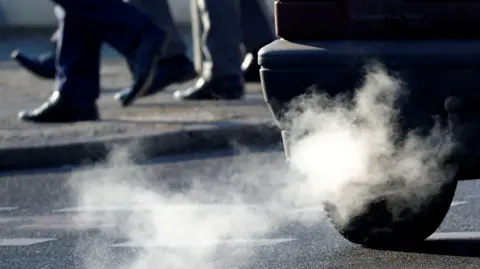Demand for more ambitious air quality targets
 Reuters
ReutersMore ambitious targets for improving air quality need to be set by the Welsh government in order to tackle pollution around schools, campaigners have said.
It comes as research from Friends of the Earth Cymru suggests more than 200 schools in Wales may be situated in areas where chemicals in the air exceed World Health Organization (WHO) guidelines.
Two-thirds of those schools were in Cardiff, but the council has urged caution and said individual measurements at some locations showed lower levels of pollutants in reality.
The Welsh government said it would soon start consulting on promoting awareness of its air pollution delivery plan.
Environmental campaign group Friends of the Earth Cymru has analysed figures from the UK Department for Environment, Food and Rural Affairs (Defra) which suggested nitrogen dioxide (NO2) and particulate matter (PM2.5) is too high for 65,000 Welsh pupils.
Pupils on the eco committee at Roath Park Primary School in Cardiff said they did what they could to encourage their friends and parents to reduce car use to help the environment.
Ada, 11, said she was concerned air pollution would affect herself and her friends with asthma as "children's bodies are still growing".
"They can get ill and it can affect their bodies and get into their bloodstream which can seriously damage their lungs," she said.

Fatima, 11, said she encouraged her parents and friends to find environmentally friendly ways of getting around.
"I usually tell my parents off for driving the car too much, and ask them to walk to school instead of drive.
"I live a bit far - but it's not too far so I just walk."
Seren, 11, said she and her fellow committee members were growing plants to try and improve air quality.
"It would be better if we could all do something like plant more plants or make more cars on the road electric so they don't produce the fumes that go into the atmosphere," she said.

Director of Friends of the Earth Cymru, Haf Elgar, said she wanted everyone to take action to reduce air pollution.
"This data proves that we've got a real crisis in air pollution in Wales, particularly in our cities in terms of what we've measured here," she said.
"The list of 200 schools makes it obvious that we need to do more. The government has a duty as well as the local authorities and us as individuals. There's a responsibility on everyone."
New legislation was passed last year to clean up the air in Wales, but Ms Elgar said that should be just the start of the process.
"We now need to set targets in legislation so that everyone knows what we're aiming for," she said.
"That we've got ambition to reduce our air pollution and that leads to action across all government departments."
Cardiff council said all monitoring locations in the city currently meet existing legal air quality objectives and all schools monitored by the local authority recorded concentrations "significantly less" than the Friends of the Earth Cymru research.
The local authority added it welcomed the report as "Cardiff is very much aware of the health concerns from poor air quality and its potential impact on our children".
A spokesperson for the council added: "It should be noted that the WHO guideline values are based solely based on scientific conclusions about public health aspects of air pollution.
"The guidelines do not take into consideration the technical feasibility or the economic and social aspects of achieving these levels."

Joseph Carter from Healthy Air Cymru, a coalition of partner organisations in Wales working to improve air quality, said air pollution was linked to asthma in children, with a growing number of people living with the condition in Wales.
"Air pollution is a terrifying thing. The more time goes on, the more we learn about what it could cause," he said.
Mr Carter said individuals and organisations needed to make real changes and called for legislation to prevent cars idling while waiting at the side of the road.
"We need to think about how we work, how we live and what society looks like here in Wales," he said.
The Royal College of Physicians (RCP) said there was "no safe level" of air pollution and is calling on the Welsh government to take urgent action.
Dr Hilary Williams, vice-president for Wales at the RCP, said: "The number of preventable deaths attributable to poor air quality makes clear that this is a public health crisis that cannot be ignored.
"For people living with asthma, poor air quality directly affects their risk of hospital admission and impacts everyday activities, and we're learning more how it contributes to other conditions including dementia, heart disease and cancers.
"Clean air is a right, not a privilege and improving air quality must be treated as a core public health priority."
The Welsh government said it was providing funding to local authorities to improve air quality through its Local Air Quality Management Support Fund.
"This year, the fund will provide £1m to support a range of activity across the country, including initiatives at schools," they said.
"This summer we will consult on our Promoting Awareness of Air Pollution Delivery Plan, which has been developed in partnership with stakeholders. Through the plan we will support national communication campaigns, educational resources, and guidance, enabling positive change and ensuring people have the information they need to take action.
"Raising awareness of air pollution issues with children and young people has been a key consideration in the development of our draft plan."
